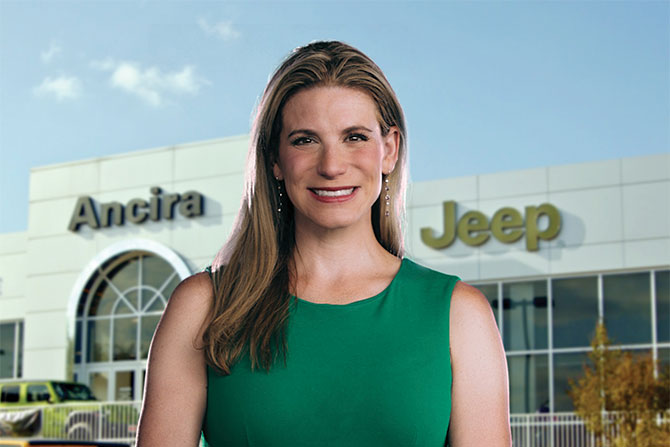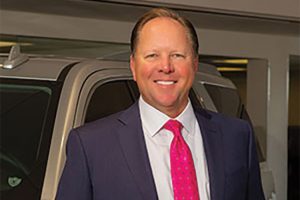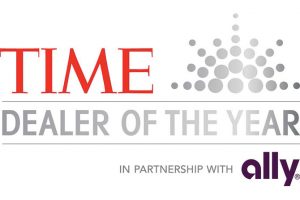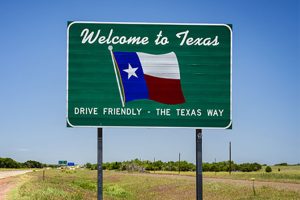By The Texas Automobile Dealers Association
You come from a car family, and the automotive industry would have been the obvious choice. Did you always aspire to be part of the automotive industry?
I wanted to do something different because I was shy and preferred being quiet. When I was very young, my parents thought I might go into public service. Becoming a veterinarian was also on the table because I pretty much only really spoke to animals. However, I did work for my dad between the ages of 16 and 18 because I wanted money for clothes. I was paid minimum wage – I was the only person in the dealership making minimum wage.
I also worked as a waitress. I loved it and learned a lot about people.
During the summer between earning my bachelor’s degree and starting my master’s program, I wanted to sell cars to earn money for school, and I found that the whole experience had a different aspect than it had before. My first sale was to a man named Patrick Karem. It was such a good experience. We sat outside, with me sitting on concrete, and I wrote up the paperwork. He bought a car the next day. Then I sold another car. After selling four cars in two days, I was in love. I think that was the deciding factor that the auto industry was for me.
My master’s degree took three semesters to earn, and while I was studying, I also worked through all departments at the dealership. I especially liked the service department. Still, I saw potential there to improve the department, and I decided that someday I would fix the problems I saw there.
I liked parts, too. After I graduated, I became an operations specialist and used my newly acquired computer skills to build reports. We currently still use a lot of the reports I made.
Is your entire family in the auto industry?
My dad has five daughters. The first two older sisters dabbled in it, but they have both passed away. My other two sisters chose different career paths. So it’s me, my dad, my husband and my uncle who all work at the dealership. It’s all very organic.
Describe your educational background. What did you study?
I have a bachelor’s degree from Trinity University and a master’s degree from the University of Texas, San Antonio. Our president, Darren, is also a Trinity graduate, by the way.
I learned how to overcome my shyness while I was at Trinity University. When I was there, I was looking at the classes I needed. I thought, “What’s the scariest class I can take?” The answer was a speech class. I took it, and it was awful at first. I struggled. But I was hooked by the end of the class. My final assignment was about my journey as I learned to speak to others confidently. That class gave me so much confidence that now I won’t shut up. Afterward, I became a cheerleader at Trinity. My dad thinks that I got my confidence from being a cheerleader at Trinity, and that did help, but I credit the speech class. Now I even do stand-up comedy.
I initially chose marketing as my major at Trinity, with a focus on advertising and content. But then I fell in love with trading on the stock market, so I switched my major to finance and economics. I wanted to go to Wall Street and make my mark there. This goal was realistic because my dad had a cousin who had a relationship with the management at Smith Barney, and could have helped with securing an interview when I was in my senior year in college. But then 9/11 happened, defense spending increased and there was a U.S. debt crisis. The opportunity was gone there, but I found my passion for the auto industry.
As a woman in this business, why do you think there are so few other women?
The main issue is probably scheduling. This business is hard for women even though there are more and more stay-at-home dads. When I sold cars, there would always be a customer who could only come in on my day off; sure enough, I would find another customer once I came in, and I would end up working the entire day. I often put in long hours as a result of trying to help people.
Sales is just not a 9-to-5 job. Trying to do your job, and do it well, requires a lot of flexibility in that department. If you are unavailable, you often have to split the deal because you were unavailable for some of the time it took. In contrast, there are more women in accounting because the hours are more reliable and set.
Our society needs to shift culturally to accommodate people with families. Solving such a big, pervasive problem might be intimidating, but it has to be done. Sometimes people do have to take random days off to deal with issues such as children who are sick. As a dealership, you have to figure out how to accommodate those needs.
Do you think the industry needs to increase its efforts to employ more women?
The old stereotype was for dealership employees to talk business with men, but not with women. Now, I would say we need more women and also more minorities. There’s an industry trend to hire both because diversity makes for a healthy work environment, whether you are an employee or a customer.
We especially need to do a better job as an industry at increasing diversity in the sales and service departments. We can still accommodate our customers even if we have to juggle responsibilities. Once we do become more diverse, that’s a selling point, and we need to find ways to tell people about what we’ve done.
We all need an atmosphere where everyone is accepted, and customers can identify with some of the dealership’s employees. On a subconscious level, customers who see organizational diversity have a higher level of trust in the dealership. They know the dealership has a broader perspective than is the case at a less diverse dealership.
As a family owned business, we work hard to accommodate everyone’s schedule regardless of gender. But when I can hire a female technician, I get so excited. We work to be flexible because she brings a more diverse experience with her.
Why is the automobile industry an excellent place for women?
There are opportunities in this industry if you work hard. You can gain peace of mind from dreaming big and consistently succeeding.
The majority of dealerships are very entrepreneurial, and you can make lots of money working at them. If you are a go-getter and have personal goals, you aren’t limited to what you can earn with an hourly wage. Instead, you can pencil in financial goals and create a path: “If I make this much money, I can get to here.” You can have more control over your life, especially if you save as much money as possible.
We have a gentleman from the Middle East at our dealership. He rode a donkey to school when he was young if it was available. He is our best salesperson, earning $400k-$500K, and he is currently on track to sell 800 units. That’s the most he has ever sold. We can’t promote him; he makes more money than I do, but he doesn’t have the same responsibilities or expenses. The man is his own entrepreneurial business. That’s exciting.
The next most successful salesperson is at 200 units or so, which is still great. But we also have some people who sell just eight units a month.
Are there any specific individuals who had a major impact on your career?
First is my dad. He taught me that employees are like family; without them, there is no Ancira Auto Group. My husband, Jason, is important, too. He is the micro, I am the macro, and we work so well together day-to-day.
I also credit our former president, Bill Wolters. He was a visionary who also valued involvement, and he had a lot to do with my excitement with dealers as a group. He made me feel that dealers were more than people who sold or fixed a piece of metal. He would say, Look at the jobs you create and the good you do in your communities. He put numbers to it. I never looked at dealers the same way after he described them. Thanks to him, I value the industry.
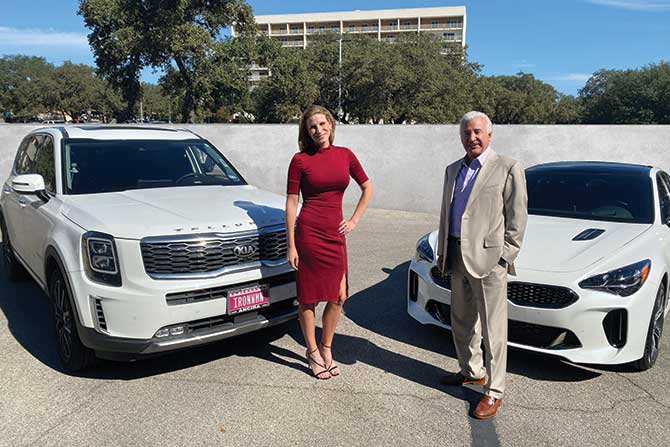
What is the most rewarding part of your career?
I enjoy turning the view of the industry around. I think car buying and car service should be fun. At our dealership, we love being part of the excitement.
What do you think will be some of the auto industry’s dominant trends in the next 5-10 years?
It’s important to see industry trends, but it’s hard to put my money on any specific one when they appear on the horizon. I am bad at predicting what will happen. Instead, I decided flexibility is more important when it comes to being prepared. Flexibility allows you to move quickly to deal with something you didn’t anticipate – like the sudden need for hand sanitizer!
We didn’t expect COVID, but we could already make sales at the store or online and make home deliveries when it hit. I had always been a proponent of home deliveries. I was promoting them on billboards before the pandemic. We were totally ready to make home deliveries. Interestingly, we only made one or two. Most people wanted to come into the dealership. But we’re still prepared for home delivery if that changes.
Everyone is looking at huge trucks right now because gas prices are low, and as a result, we’ve had one of our best years in the industry. We are currently selling bigger vehicles regardless of the push for smaller ones, but people will want small cars again if gas increases substantially per gallon. It’s a cycle.
Long-range electric vehicles will change the dynamic between large vehicles and small ones, but since it’s a push to get there, it’s hard to say how quickly the shift will occur. Change in Texas happens more slowly than in states like California, and it only appears when there is some major event or significant trend.
Direct sales aren’t a trend in Texas yet, because rural areas are less accessible, but they are a constant talking point.
Franchise laws are important for dealers and consumers because they can keep pricing competitive.
Why is it important to be a TADA member? What makes it beneficial?
Being a member is fantastic. We can make real-time decisions because we have great information. The staff is like a team, and they are accessible when you need help or an answer to a question. For example, if I have a legal question, I know I can call Karen and get the information I need to pivot.
TADA does work you don’t have to think about so you can run your dealership. During the pandemic, they’ve helped to keep us safe, happy and healthy. They leverage my time. Their work will continue to be crucial in the future.
Thanks to TADA, I am also good friends with my competitors.
What inspired you to serve as a leader within the association?
It happened organically, but I have had great mentors in people like Bill. They took an interest in me. When I was 23, my dad introduced me to the local association, and then I grew up in it professionally. My dad helped; for example, he brought me along on a trip with Bill to meet with people in Mexico about NAFTA. Pam was a mentor at SADA, and so was Rob at TADA. I was invited to meet with local politicians, too. I always said yes when I was given opportunities. You learn a lot when you say yes.
Are you involved in any civic or charitable organizations?
Annually I have major charitable goals. Every year I pick a new charity to fundraiser for and I raise between $45k – $350k for that charity depending on what we are trying to achieve. I always try to top what the chairman of the previous year did or break goals as an incentive.
I’m actively on 12 boards — both charitable and professional. My goal is to quit adding to that number but I have two more already on deck, so that realistically isn’t happening. Ancira Auto Group as a whole donates in the six figures every year to chairities. Giving back to our community is important.
If you look back at your career and life, what would be three things that you have learned that you would pass onto a younger member within the auto industry?
- Be flexible, especially in your early years before you have a family and bills. Every “yes” moves you to the next opportunity, even if “yes” causes a bad or ugly experience first.
- Educate yourself continuously. Start learning about the level above the next level. Do the best you can, and learn from the people who know the most. Having the right information can close a deal.
- Communicate and network with people. You never know what running into one person can bring to you later. Sometimes there’s a reason why you met them, and something great will happen later.
TADA is a fantastic place to do all of these things, especially meeting people.
What are two things that you have learned from past experiences that are helping you navigate now?
There are two keys to weathering a storm:
- The first is having and keeping a strong financial position. Protect the dealership by making healthy decisions so you can open. Don’t make desperate decisions or operate in fear.
- The second is staying positive when you are afraid.
In the late 1980s, the U.S. had to deal with an oil embargo and a stock market crash. We knew at our dealership that if we didn’t turn it around in a month, we would be done. What made it worse was that we had employees who depended on us; it is hard to let someone go. We decided we would never go through that again, and we have been cash hoarders ever since.
When the pandemic hit, we were ready.
How did you weather the pandemic storm?
We knew we couldn’t shut down because we are essential. People need their transportation. We also knew that the situation in April 2020 was temporary because this economic downturn wasn’t based on demand.
We started with sanitizer, a cleaning crew and mask mandates. If people felt unsafe, we told them to stay home. We changed our staffing to a skeleton crew and rotated its members. We kept everyone employed by having our own PPP plan before anyone else offered us one. We could afford it because we had saved for that proverbial rainy day.
I saw the tragedy of COVID firsthand. This past summer we lost three employees to it. That was tough. Nothing makes up for the loss of life.
What is the takeaway for you from the pandemic that will guide your future business decisions as a small-business owner and leader?
Future business decisions will be different because of the health perspectives we gained. We were ready financially, but there was a learning curve about protecting our employee’s health.
We used to have the typical hands-off approach that many small businesses have, and we were not as involved in our employees’ health as we are now. Some employees did not get the best care because they didn’t know where to find it.
We loved the three employees who passed away, so we decided to be more proactively involved. We identified a doctor who is far more aggressive about doing things the hospital didn’t. We think he could have saved the lives of the ones we lost. Now the HR department gets involved and will tell an employee, “You need to see this doctor.” People are doing better as a result.
What are you and your dealerships doing for first responders?
Our service and sales departments focused on keeping first responders mobile.
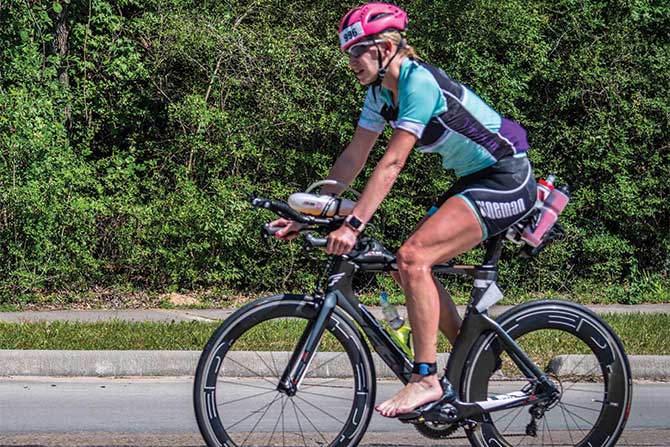
Describe your all-time favorite vehicle (it can be one you’ve owned, or something on your wish list). What are you driving now?
My all-time favorite car is actually a minivan. Yep, a minivan. I drove a Chrysler Town & Country for over a decade. My husband had to pry me out of it and into an SUV.
I also owned and loved the Cadillac CTS-V — that V made it everything.
I am also a huge fan of Kia products, and I bought a Kia Telluride. Kia builds sports cars and SUVs that combine power with excellent gas mileage, and they rarely break down.
Tell us about your family.
My husband is named Jason, and we have two children, Gunner (10) and Hope (8). We also have a dog named Gracie. She’s a rescue mix. The children love her, and she calms us down. We all feel better when we pet her.
Our children are in our commercials. Some man told me it wouldn’t be becoming if I were pregnant in my commercials, but I had another adviser who told me to be myself. That sounded right. We wove my pregnancy into our commercials, and later on, we involved them in reality-style TV commercials. We get a lot of favorable comments.
What is your favorite way to spend your free time? Any unusual hobbies?
My hobby is doing scary things to find out whether I can do them. That’s how I got into doing stand-up comedy. It was a way to stop trying so hard. In the beginning, I bought all the joke books I could find. I also have my pilot’s license. I was a horrible singer, so I took singing lessons, and I ended up singing the national anthem at a game for the San Antonio Missions baseball team.
Biking became another interest when I gained 40 pounds while I was pregnant with my son. I hired a coach to teach me how to bike. At first, I couldn’t get the water bottle off after I clicked into the pedals, but I wanted to drink when I am thirsty. It took two days to learn how to clip in the bottle and not fall. But I rock it now.
Another fitness project was competing in a small, one-hour triathlon. I won second place, but the real goal was getting back into shape. I ran a half-marathon, then I ran a full marathon, and after my daughter was born, I ran another full marathon. Now I am focused on Ironman races, where you swim, bike and run 140.6 miles. By October 2022, I hope to do my 13th ironman in Kona.
The Texas Automobile Dealers Association
This story appears in Issue 6 2020 of the Dealers’ Choice Magazine.

